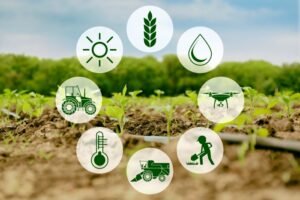Sustainable agriculture technologies are revolutionizing farming practices, making them more efficient, environmentally friendly, and resilient. These technologies aim to enhance productivity while minimizing the impact on natural resources and ecosystems. By integrating advanced solutions, farmers can address challenges such as climate change, resource scarcity, and soil degradation. Here’s a look at some key sustainable agriculture technologies shaping the future of farming.
Precision Agriculture
Optimizing Resource Use
Precision agriculture utilizes GPS, IoT sensors, and data analytics to optimize the use of resources such as water, fertilizers, and pesticides. By analyzing soil conditions and crop health in real-time, farmers can apply inputs more precisely, reducing waste and improving crop yields. This technology not only enhances productivity but also minimizes environmental impact by preventing overuse of resources.
Monitoring Crop Health
Drones and satellite imagery are increasingly used to monitor crop health and growth. These tools provide detailed insights into crop conditions, allowing farmers to detect issues such as pests, diseases, or nutrient deficiencies early. By addressing problems promptly, farmers can take targeted actions to improve crop health and reduce the need for chemical interventions.

Vertical Farming
Maximizing Space Efficiency
Vertical farming is an innovative approach that involves growing crops in vertically stacked layers or towers. This method allows for high-density production in urban areas and reduces the need for large plots of land. Vertical farms often use hydroponic or aeroponic systems, which use less water and nutrients compared to traditional soil-based farming.
Reducing Environmental Footprint
Vertical farming systems are typically housed in controlled environments, which means they can operate year-round, independent of weather conditions. This reduces the need for transportation and long supply chains, decreasing the carbon footprint associated with food production. Additionally, vertical farms can help reduce urban heat islands and improve air quality.
Agroforestry
Integrating Trees and Crops
Agroforestry involves integrating trees and shrubs into agricultural landscapes to create diverse and sustainable farming systems. This practice enhances soil fertility, conserves water, and provides habitat for wildlife. By combining trees with crops or livestock, farmers can achieve multiple benefits, such as increased biodiversity, improved soil structure, and enhanced resilience to climate variability.
Improving Soil Health
Trees and plants in agroforestry systems contribute to soil health through the addition of organic matter and the prevention of erosion. The roots of trees can help stabilize the soil and reduce runoff, while leaf litter provides valuable nutrients. This holistic approach supports long-term agricultural productivity and sustainability.
Smart Irrigation Systems
Efficient Water Management
Smart irrigation systems use sensors and data analytics to manage water usage more efficiently. These systems monitor soil moisture levels and weather conditions to determine the optimal amount of water needed for crops. By avoiding over- or under-watering, smart irrigation helps conserve water resources and reduces the risk of crop stress.
Adapting to Climate Variability
Smart irrigation systems can be programmed to adjust watering schedules based on real-time weather forecasts and changing climate conditions. This adaptability ensures that crops receive adequate water throughout different seasons, enhancing resilience to climate variability and reducing water waste.
Renewable Energy Integration
Utilizing Solar and Wind Power
Renewable energy technologies, such as solar panels and wind turbines, are increasingly being integrated into agricultural operations. These technologies provide a sustainable source of energy for powering farm equipment, irrigation systems, and greenhouse operations. By reducing reliance on fossil fuels, renewable energy contributes to lower greenhouse gas emissions and operational cost savings.
Enhancing Energy Efficiency
In addition to generating renewable energy, farmers can also implement energy-efficient practices such as LED lighting, energy-efficient irrigation pumps, and insulated greenhouses. These measures help reduce energy consumption and improve overall sustainability in agricultural operations.
Biopesticides and Organic Farming
Reducing Chemical Use
Biopesticides are natural or derived from natural sources and are used to manage pests and diseases without relying on synthetic chemicals. These products often have fewer side effects on non-target organisms and can contribute to healthier ecosystems. Organic farming practices, which avoid synthetic pesticides and fertilizers, also promote soil health and biodiversity.
Promoting Soil Health
Organic farming emphasizes the use of compost, cover crops, and crop rotations to maintain soil fertility and structure. These practices improve soil health and reduce the need for chemical inputs, contributing to a more sustainable and resilient agricultural system.
Conclusion
Sustainable agriculture technologies are transforming the way we produce food, making farming practices more efficient, eco-friendly, and resilient. Precision agriculture, vertical farming, agroforestry, smart irrigation, renewable energy, and biopesticides represent just a few examples of how innovation is driving positive change in agriculture. By adopting these technologies, farmers can address environmental challenges, improve productivity, and contribute to a more sustainable future for global food systems.
